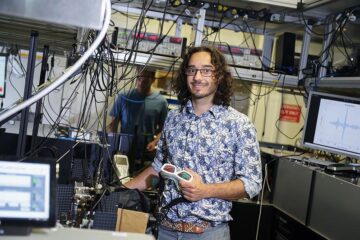EU support of new technologies to increase plant productivity – 5 Million Euro for plant breeding

In the face of an increasing global population the productivity of agriculture needs to be considerably improved. However, traditional plant breeding techniques are reaching their limits. Therefore, out-of-the-box solutions are required to support a new green revolution. Dr. Arren Bar-Even and five partners from academia and industry peruse new approaches to employ synthetic biology tools in the aim to re-wire plant metabolism and enhance their growth rate and yield.
The 5-years project “FutureAgriculture” is funded with 5 Million Euro by the European Commission. The FET Open program supports the development of new unconventional and visionary ideas with long-term potential. This allows the identification of promising henceforth research areas. In the current application period 12 out of 670 submitted projects were selected for funding.
Dr. Arren Bar-Even’s team at the Max Planck Institute of Molecular Plant Physiology and his research partners will work on improving the yield and rate of carbon fixation in plants, which is often the limiting part of photosynthesis. Specifically, the team will focus on a process termed photorespiration, in which energy is lost and fixed carbon is released, thereby limiting plant growth. By evolving new enzyme chemistries, the scientists aim at engineering new pathways that avoid the negative effects of photorespiration.
The research project is structured into four phases. First, promising candidate pathways will be identified by computer analysis and modeling. The most effective pathways – the shortest and most energy-saving ones – will be evolved and constructed in test tubes. Next, the pathways will be integrated in single-cell bacteria and algae. For this purpose, Echerichia coli and Chlamydomonas, two model organisms in biology, will be used. In the last phase the most efficient pathways will be introduced into higher plants, followed by a detailed analysis and characterization.
This interdisciplinary project started at January 1st, 2016. Dr. Arren Bar-Even is coordinator of the project. The other partners involved are Dr. Tobias Erb (Max Planck Institute of Terrestrial Microbiology / SYNMIKRO, Germany), Dr. Patrik Jones (Imperial College London, UK) and Prof. Dan Tawfik (Weizmann Institute of Science, Israel), as well as two companies, Evogene (Israel) and IN S.r.l. (Italy).
The Max Planck Institutes
The two Max Planck Institutes belong to the Max Planck Society, Germany's most successful research organization in the field of basic research.
The Max Planck Institute of Molecular Plant Physiology investigates metabolic and molecular processes at different levels in plants. The overall goal is to understand how metabolism and growth are regulated and to learn how they respond to different factors.
The mission of the Max Planck Institute for Terrestrial Microbiology is to understand how microorganisms function at the molecular, cellular, and community level. At the Center of Synthetic Microbiology (SYNMIKRO), synthetic biology approaches are used to understand and engineer microorganisms.
The Imperial College London
Imperial College London is a science-based university. The Faculty of Natural Sciences research strategy is to meet the changing needs of society, industry and healthcare, and to address the global challenges of climate change, energy, global health and security.
The Weizmann Institute of Science
The Weizmann Institute of Science is one of the world’s leading multidisciplinary basic research institutions in the natural and exact sciences. The Faculty of Biochemistry research focuses on the processes of life at the levels of molecules, cells, organs, organisms and ecosystems.
Evogene
Evogene is specialized in improving plant traits through applying biotechnology and advanced breeding for a wide variety of crops. Their main focus is on the discovery of genes, linked to traits, such as improved yield and drought tolerance.
IN S.r.l.
IN S.r.l. is an agency whose mission is to support private and public organizations in participating in EU, national and local innovation projects and to provide professional project management services.
Contact:
Dr. Arren Bar-Even
Max Planck Institute of Molecular Plant Physiology
Tel. 0331/567 8910
Bar-Even@mpimp-golm.mpg.de
Dr. Ulrike Glaubitz
Press and public relations
Max Planck Institute of Molecular Plant Physiology
Tel. 0331/567 8275
Glaubitz@mpimp-golm.mpg.de
http://www.mpimp-golm.mpg.de
Media Contact
Alle Nachrichten aus der Kategorie: Förderungen Preise
Neueste Beiträge

Neue universelle lichtbasierte Technik zur Kontrolle der Talpolarisation
Ein internationales Forscherteam berichtet in Nature über eine neue Methode, mit der zum ersten Mal die Talpolarisation in zentrosymmetrischen Bulk-Materialien auf eine nicht materialspezifische Weise erreicht wird. Diese „universelle Technik“…

Tumorzellen hebeln das Immunsystem früh aus
Neu entdeckter Mechanismus könnte Krebs-Immuntherapien deutlich verbessern. Tumore verhindern aktiv, dass sich Immunantworten durch sogenannte zytotoxische T-Zellen bilden, die den Krebs bekämpfen könnten. Wie das genau geschieht, beschreiben jetzt erstmals…

Immunzellen in den Startlöchern: „Allzeit bereit“ ist harte Arbeit
Wenn Krankheitserreger in den Körper eindringen, muss das Immunsystem sofort reagieren und eine Infektion verhindern oder eindämmen. Doch wie halten sich unsere Abwehrzellen bereit, wenn kein Angreifer in Sicht ist?…





















